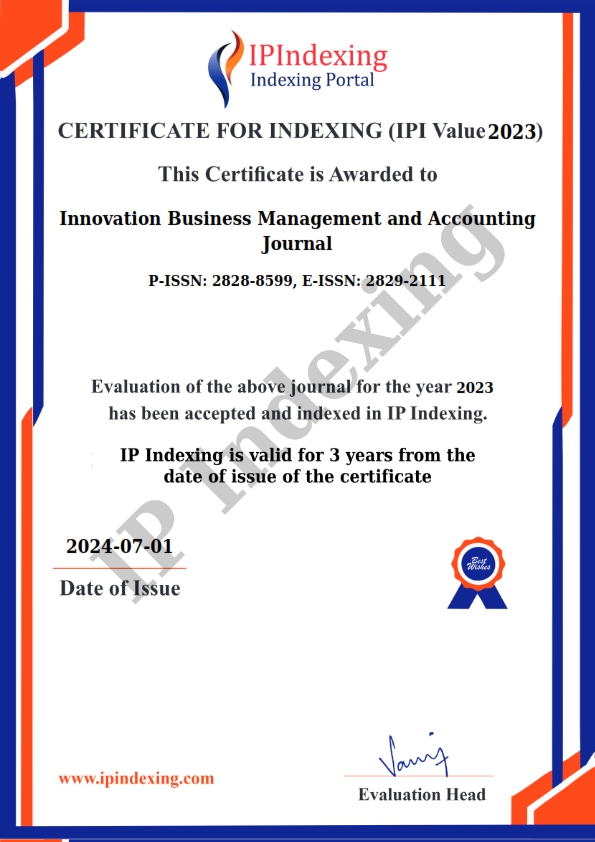Application of the Principles of Accounting Ethics in Java culture
DOI:
https://doi.org/10.56070/ibmaj.icals.2024.012Keywords:
Javanese Culture, Accounting Ethics, Indonesian Accountant Code of Ethics, Principles of Accounting EthicsAbstract
This research examines the application of ethical accounting principles in Javanese culture as well as the noble values of Javanese culture that can support the application of accounting ethics with a focus on Indonesian society. This approach is carried out through a literature review that studies the relationship between Javanese cultural values and the accountant's code of ethics. Accounting ethical theory, Javanese culture, and the Indonesian Accounting Code of Ethics (KEAI) are the focus of this research. The results of the literature review show that Javanese culture has noble values such as bener (honesty), ngrasa (openness), responsibility (responsibility), gotong royong (gotong royong), isin/sungkan (shame), deliberation (deliberation), tepo seliro (mutual respect), rahayu (hope for goodness), ojo angkuh (don't be arrogant), and mergawe seng temenan (work hard). consistent with ethical accounting principles of integrity, objectivity, and accountability. The application of Javanese cultural values in accounting practices can help ensure that accountants carry out their duties with integrity, honesty, and high responsibility while still paying attention to the interests of society.
Downloads
References
Aditian, A., Levia roza, L. roza, & Iqbal hadi pradana, I. hadi pradana. (2024). Literatur review : analisis etika dan profesi akuntan. Journal of Management and Innovation Entrepreneurship (JMIE), 1(2), 217–227. https://doi.org/10.59407/jmie.v1i2.344
Afifah, S. N., Hanifah, M. N., Auldri, F., Hudori, H. A., Yulianto, A., Prabowo, M. A., Ulfah, F., & Ahmadi, L. P. (2024). Analysis of the values of shadow puppet art in strengthening the code of ethics for accountants. Innovation Business Management and Accounting Journal, 3(2), 255–261. https://doi.org/https://doi.org/10.56070/ibmaj.2024.027
Andriyana, H., & Trisnaningsih, S. (2022). Analisis pelanggaran etika dan kode etik profesi akuntan di era persaingan yang kompetitif (studi kasus PT. Garuda Indonesia (Persero), Tbk.). Al Qalam: Jurnal Ilmiah Keagamaan Dan Kemasyarakatan, 16(6), 2304. https://doi.org/10.35931/aq.v16i6.1568
Ansar, R., & Abubakar, K. (2022). Persepsi akuntan pendidik, akuntan pemerintah, dan mahasiswa akuntansi terhadap prinsip kode etik akuntan Indonesia. Jurnal TRUST Riset Akuntansi, 9(2), 1–11. https://doi.org/https://doi.org/10.33387/jtrans.v10i1.5585
Ardiani, N. K. A., Sunarsih, N. M., & Pramesti, I. G. A. A. (2020). Persepsi mahasiswa akuntansi, akuntan pendidik dan akuntan publik terhadap prinsip-prinsip etika dalam kode etik ikatan akuntan Indonesia. Jurnal Kharisma, 2(1), 171–180. https://e-journal.unmas.ac.id/index.php/kharisma/article/view/764
Bhilawa, L. (2024). Skeptisisme profesional auditor dari sudut pandang filsafat Jawa “ojo dumeh, eling lan waspodo.” Jurnal Akuntansi Integratif, 10(1), 45–54. https://doi.org/https://jurnalfebi.uinsa.ac.id/index.php/JAI/article/view/1559
Christina, Jennifer, M., & Novriyanti. (2022). Menganalisis kode etik profesi akuntan publik pada Indonesia. Inisiatif: Jurnal Ekonomi, Akuntansi Dan Manajemen, 2(1), 386–395. https://doi.org/10.30640/inisiatif.v2i1.536
Dinna Riyani, D. R., & Ardini, L. (2021). Kontruksi prinsip dasar etika profesi akuntan: internalisasi karakter pewayangan pandawa lima. WACANA EKONOMI (Jurnal Ekonomi, Bisnis Dan Akuntansi), 20(2), 84–93. https://doi.org/10.22225/we.20.2.2021.84-93
Eliezar, D. (2020). Pendidikan anti korupsi dalam budaya Jawa. Scholaria: Jurnal Pendidikan Dan Kebudayaan, 10(1), 66–72. https://doi.org/10.24246/j.js.2020.v10.i1.p66-72
Hanipa, S. D., Prabowo, M. A., & Rismawati. (2023a). Mengintegrasikan nilai-nilai budaya Jawa dalam memperkuat profesionalisme. Jurnal Akuntansi STIE Malang, 9(2), 221–239. https://doi.org/http://dx.doi.org/10.35906/jurakun.v9i2.1587
Hanipa, S. D., Prabowo, M. A., & Rismawati, R. (2023b). Mengintegrasikan nilai-nilai budaya Jawa dalam etika dan kode etik akuntan publik untuk memperkuat profesionalisme. Jurnal Akuntansi STIE Muhammadiyah Palopo, 9(2), 221. https://doi.org/10.35906/jurakun.v9i2.1587
Hasibuan, H. T. (2021). Penerapan akuntansi dalam perspektif budaya Jawa pada pedagang nasi jinggo di Denpasar. Jurnal Inovasi Penelitian, 2(1), 149–160. https://doi.org/10.47492/jip.v2i1.615
Josephine, P., & Bonnie, S. (2021). Konstruksi kode etik profesi akuntan pendidik berbasis nilai-nilai semar. Calyptra, 9(2), 1–15. https://journal.ubaya.ac.id/index.php/jimus
Khairunissa, O., & Juli Ratnawati. (2021). Akuntansi keperilakuan dalam pitutur luhur kejawen. Tjyybjb.Ac.Cn, 27(2), 58–66. https://doi.org/https://doi.org/10.36733/juara.v14i1.8495
Lannai, D., & Prabowo, M. A. (2016). Strengthening the auditor ethics with Bugis culture value in phenomenology perspective at Makassar-Indonesia. Australian Journal of Basic and Applied Sciences, 10(November), 263–274. http://ajbasweb.com/old/ajbas/2016/November/263-274.pdf
Muria, R. M., & Alim, M. N. (2021). Perilaku etis dan kode etik akuntan profesional dalam akuntan publik. Wacana Equiliberium (Jurnal Pemikiran Penelitian Ekonomi), 9(01), 41–52. https://doi.org/10.31102/equilibrium.9.01.41-52
Prabowo, M. A., Hanifah, M. N., Abduh, M., Kalsum, U., & Jefriyanto, J. (2023). Internalisasi nilai kearifan lokal budaya Jawa dalam kode etik akuntan. Wahana Riset Akuntansi, 11(2), 89. https://doi.org/10.24036/wra.v11i2.124175
Prabowo, M. A., Umam, F., Hidayani, H., Sugama, A., Ummah, R., & Rahmat, R. (2023). Konstruksi Aswaja An-Nahdliyah dalam penguatan kode etik akuntan. AKTSAR: Jurnal Akuntansi Syariah, 6(1), 1. https://doi.org/10.21043/aktsar.v6i1.19864
Surajiyo, S. (2022). Prinsip-prinsip etis profesi akuntan. Prosiding Serina, 781–788. https://doi.org/https://doi.org/10.24912/pserina.v2i1.19803
Ulfah, F., Prabowo, M. A., Aryani, H. F., & ... (2023). Concept of accountant ethics based on Javanese cultural values. Innovation Business Management and Accounting Journal, 2(3), 200–204. https://doi.org/https://doi.org/10.56070/ibmaj.v2i3.63
Zunaidi, D. S. (2020). Penerapan “rukun agawe santoso” pada akuntan publik dalam memberikan jasa akuntansi dan pembukuan. Www.Researchgate.Net, November. https://www.researchgate.net/publication/345902496_PENERAPAN_RUKUN_AGAWE_SANTOSO_PADA_AKUNTAN_PUBLIK_DALAM_MEMBERIKAN_JASA_AKUNTANSI_DAN_PEMBUKUAN
Downloads
Published
How to Cite
Issue
Section
License
Copyright (c) 2025 Muhammad Aras Prabowo, Rismawati, Vita Aulia, Mariska Nur Hanifah

This work is licensed under a Creative Commons Attribution-ShareAlike 4.0 International License.


